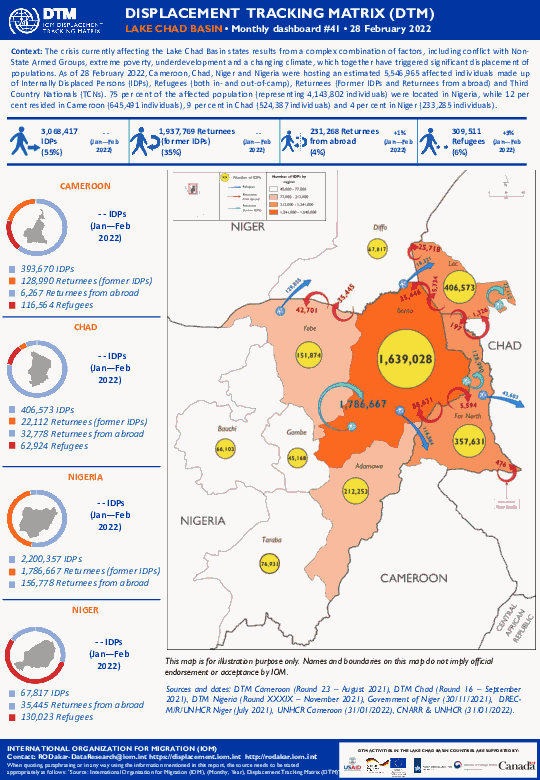-
Countries
-
Data and Analysis
-
Special Focus
-
Crisis Responses
West and Central Africa — Lake Chad Basin Crisis Monthly Dashboard 41 (28 February 2022)
The crisis currently affecting the Lake Chad Basin states results from a complex combination of factors, including conflict with Non-State Armed Groups, extreme poverty, underdevelopment and a changing climate, which together have triggered significant displacement of populations. As of 28 February 2022, Cameroon, Chad, Niger and Nigeria were hosting an estimated 5,546,965 affected individuals made up of Internally Displaced Persons (IDPs), Refugees (both in- and out-of-camp), Returnees (Former IDPs and Returnees from abroad) and Third Country Nationals (TCNs). 75 per cent of the affected population (representing 4,143,802 individuals) were located in Nigeria, while 12 per cent resided in Cameroon (645,491 individuals), 9 per cent in Chad (524,387 individuals) and 4 per cent in Niger (233,285 individuals). The crisis currently affecting the Lake Chad Basin states results from a complex combination of factors, including conflict with Non-State Armed Groups, extreme poverty, underdevelopment and a changing climate, which together have triggered significant displacement of populations. As of 28 February 2022, Cameroon, Chad, Niger and Nigeria were hosting an estimated 5,546,965 affected individuals made up of Internally Displaced Persons (IDPs), Refugees (both in- and out-of-camp), Returnees (Former IDPs and Returnees from abroad) and Third Country Nationals (TCNs). 75 per cent of the affected population (representing 4,143,802 individuals) were located in Nigeria, while 12 per cent resided in Cameroon (645,491 individuals), 9 per cent in Chad (524,387 individuals) and 4 per cent in Niger (233,285 individuals).

